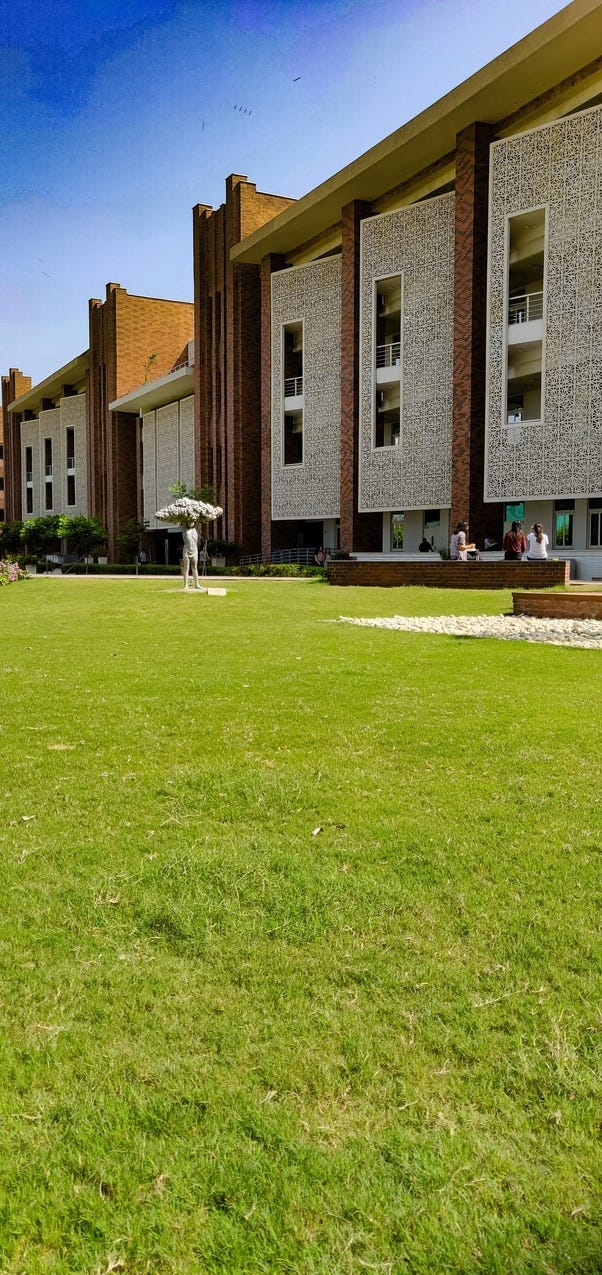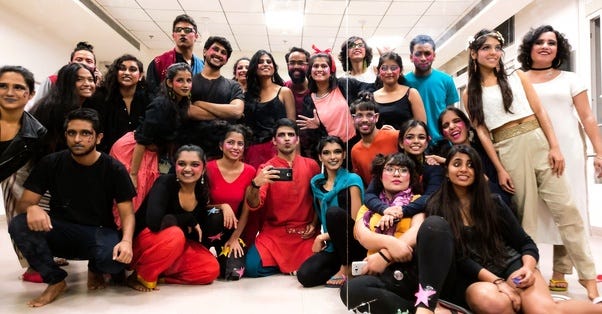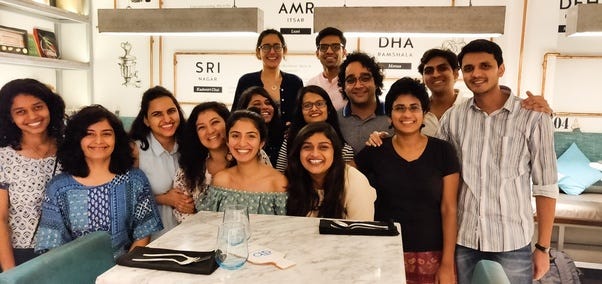I am often asked “Why YIF?” What truly is this fellowship that everyone holds in such high regard? How do I define the YIF experience? Will YIF add any value to my personal and professional life? I will attempt to answer these questions through this post.
But more often that not, folks looking to apply to YIF reach out to me to understand about the structure of the fellowship, what is the value-add, what are the opportunities post YIF, what are the courses that are taught and finally on why I chose to attend it. Most of it, in my opinion, are what I call the “First Order Questions” – answers to which can be found online (Just ask Google). Hence, I always advise those who reach out to me to first use the best available tool (the internet) to learn what YIF offers and then reach out to fellows for their take on the programme.
The objective of this post is, however, to walk you through my journey before, during and after the fellowship. This is to help you get an idea of how and why I decided to take up the fellowship, how I maximized my experiences there, and how I take everything I’ve learnt and apply it to my life post the fellowship.
Before I begin, below are some key resources that might help you get a preliminary sense of what the YIF programme is really about. Please go through them before reading the post to ensure that you can get the maximum out of this answer.
This is how you should begin your research:
Visit the website – The Young India Fellowship
Especially read the ‘about’ section to know where the roots of YIF emerge from. Read about the timelines, the eligibility, the admission process, etc. The website is a goldmine to get a preliminary sense of what the Fellowship entails and things that people have gone on to do ‘Beyond YIF’
YouTube videos –
The YIF channel on YouTube has some amazing interviews of the 3Fs – The Fellows, the Faculty and the Founders, and some lovely videos made by the previous batches. Please watch them before you reach out to any fellow to ask them about their experiences. These videos will give you a visual feel of what the Fellowship is going to be all about.
Visit the campus – It’s beautiful

The Ashoka University campus is a one-hour drive from Delhi. I would highly recommend that you plan a visit there, attend a few classes, interact with the fellows, talk to the faculty and get a feel of how it is to be on campus (there are open classes that you can attend - do reach out to the admissions team for the same). While many of you might not be from Delhi, and feel that this idea seems irrational – I would argue otherwise. Many of you will also have to pay a hefty fee anywhere between 5-10 lacs, and a short trip to campus that is only likely to cost you a few thousands is definitely worth it. I remember having taken a couple of days off from work just to fly down to campus. Despite all my research online and having spoken to fellows, it was only after visiting the campus did I realize how much I wanted to be there.
Before I begin, I must admit that there are something things in life that can only be experienced, never explained. However, I will make the best attempt to give you a sneak peak into who I am and why I decided to go to the fellowship –
I spent my childhood in Kolkata and then moved to Delhi to study business and finance at the Shri Ram College of Commerce in Delhi University. Back then I was a finance geek, mesmerized by the glamorous world of investment banking and so I landed a job with Deutsche Bank’s investment banking team immediately after graduating in 2016. A couple of months into my job, I realized that while I liked the world of finance, it did not quench my thirst for intellectual curiosity. It did not represent who I was and who I wished to be. I clearly remember the evening in London, while walking back from Deutsche Bank’s office, when I realized that I wanted to take a different path - I wanted to apply to YIF. My friends and family could not fathom the fact that I wanted to leave such a wonderful job, abandon that fat paycheck and take a leap of faith for a fellowship that did not define a clear end-purpose for the world. But I knew that it was exactly what I wanted to do - for the very first time take up something that was not teleological. For a kid who had always thrived in competition, been top of class, and had been influenced by the single philosophy of “winning is everything”, YIF was the laboratory to carry out a personal experiment. It was my chance to do something that did not have an end goal, there was no trophy to chase, there wasn’t a single winner.
I’d always wanted to explore the world of liberal arts, I was always fascinated by the world of international relations, public policy, behavioural psychology and experiential learning, and having heard the experiences of my friends who had attended the fellowship only convinced me further. While my banking friends thought I was crazy, my parents hid their apprehensions behind the undented trust they had in my decision making abilities. Most people around us do not understand what liberal arts means, and thus could not fathom why someone like me would leave a well-paying job at a reputed firm to take up a programme which did not guarantee a great career post graduating. I had no idea either. I knew it was a leap of faith, and which is precisely why I wanted to take it. If I had not gone to the fellowship before I turned 25, I would never have been able to experience something radically different from what the Indian education system has to offer to us. And so, I packed my bags to set off on a journey that remains the most beautiful part of my life.

The YIF Year
The YIF year was an action packed one. I was doing all sorts of things that I could never imagine doing anywhere else in the world – taking part in social experiments, working with low-income communities, studying art history and military strategy, walking out of classrooms with tears in my eyes, dancing in front hundreds of people, and letting myself be most vulnerable to a bunch of fellows I had only known for a few weeks. Clearly, the experiment was paying off. I had also managed to get a job very early in the year, and while some may argue that a security like that enhanced my fellowship experience, I would disagree. I knew I hadn’t come to YIF to get a job – remember, I already had a well-paying job.
However, I realized that the fellowship remains a fulfilling experience only if you follow some of the key guiding principles that I believed in when I started:
DO NOT come expecting to get a good job out of the fellowship – YIF is not the same as IIMs and it does not attract the typical firms that recruit from reputed business schools. Yes, some best-in-class consulting firms do come to recruit but they pick up a maximum of 1-2 students. For a competing pool of 400-500 students (YIFs + UGs), the odds are ALWAYS against you.
Come with an open mind – While we all carry our opinions and pre-conceived notions, the fellowship is about unlearning all of it and building on to new ones based on multiple experiences during the year. If you have your prejudices intact, you will never be able to experience what a liberal arts education has to offer. Eg: For a business student like me, I had to unlearn that the world is all about professional success and that working with the best brands is the only way to have a happy life. (It is not!)
Say “Yes” – YIF is a series of everyday experiences for one whole year. There will be a host of different things happening all around campus each day – guest lectures, workshops conducted by fellows, story-sharing experiences by your batch-mates, parties (yes, a LOT of them), dance classes, Frisbee tournaments, and many, many more. Please say “yes” to as many as you can – we all like to think that we do not like something due to either our previous experiences or because we have developed a bias against them. It is time to let your inhibitions go and explore things that you will never get to experience anywhere else.
Meet people – YIF is not just about academics. It is this one big gathering of people from all walks of life, people with stories, people with experiences, people who will make you laugh and love. It was the first time I was living and studying with architects, art majors, engineers, social entrepreneurs, designers, and many other unique individuals. It remains the only time when I could experience people and their stories, culture, languages, thoughts, and emotions all at once. And do not just limit yourself to the YIFs – go chat with the UGs, the faculty, the didis and bhaiyas who look after you. There are stories to be heard, lessons to be learnt. While I confess that I am extremely extraverted and walking up to people is easy for me, YIF is unique for it allows you to communicate in multiple ways. I remember how a fellow had initiated an anonymous letter campaign, and all of us had the opportunity to express ourselves in a manner in which we could never do so in person. I’ve recently taken to writing letters to people, and the excitement when you receive a reply back after a few days is one of the best feelings ever.
However, the most important and the best way to experience the fellowship is to be vulnerable. It is to let your guard down, let go of your inhibitions, and let your naked emotional and psychological state exist. Only then will you form the purest of human bonds, the deepest understanding of the physical and emotional space around you, and the most profound experience of your self.
Life after the fellowship is back to the mainstream reality of life – working towards a professional goal and aiming for a more fulfilled personal life. I am back to working in Mumbai, and this time around I absolutely love my job. I’ve persisted with the idea of saying “yes” to newer experiences, and a result, I enjoy a lot of theatre here in Mumbai, go on heritage walks, read genres of books that I previously would never have, share more love with everyone, and feel extremely happy about the kind of a person I have come to be. I can also see a very distinct difference in the professional and personal outlook that folks around me from the IIMs and the IITs have. I have also become more aware about our social complexities and realized how it is now impossible to ignore incidents of patriarchy around me, to not detest people who continue to laugh or joke about homosexuality or making lasting conversations with those who do not talk beyond jobs, career or money. The fellowship may not offer tangible benefits in the immediate years after graduating, but it will equip you to be able to go out there and take charge of your life. You will surely feel more confident in your professional and academic endeavors, more connected to beings around you, and develop the ability to bring in refreshing perspectives, both, at work and at home.

A strong family of over 1000 alumni will welcome you with open arms into the real world. They will give be your guiding stars on paths you choose to walk upon, barge into your house at 4 in the morning just to wake you up and take you out for breakfast, and will eventually be your home away from home.
The picture above is of our very close and connected alumni group in Mumbai.
Like all other posts that you might have come across on social media, this one too does not list down any tangible cons of the programme. This is because, in my opinion, the few that are there (eg: fees, class size, experiments with new courses, etc) are outweighed by everything else that YIF will offer to you during and after the fellowship. It’s the best investment in yourself. And like I always say,
“If you are in your 20s, and can risk quitting your job or delaying your academic endeavours, love studying the liberal arts, and are open to a whole-new way of experiencing yourself, go attend the Young India Fellowship. It might not change your life, but it will definitely change who you are and what you will come to be.”

